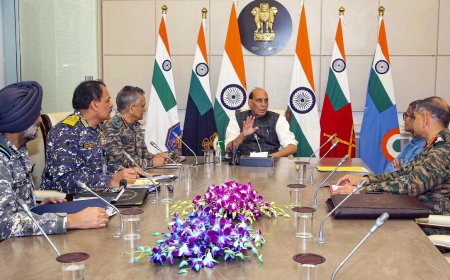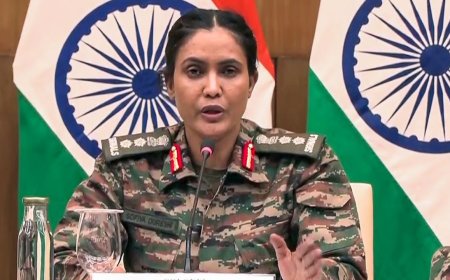RBI Portfolio Rejig: Poonam Gupta Becomes New Deputy Governor, T Rabi Sankar Gets 12 Departments
In a significant reshuffle, Poonam Gupta has been appointed as the new Deputy Governor of the Reserve Bank of India, overseeing the Monetary Policy Committee. T Rabi Sankar has been entrusted with 12 key departments, including financial market operations and currency management.

RBI Portfolio Rejig: Poonam Gupta Becomes New Deputy Governor, T Rabi Sankar Gets 12 Departments
Introduction
In a significant development at the Reserve Bank of India (RBI), Poonam Gupta has been appointed as the new Deputy Governor, taking charge on May 2, 2025. This move comes as part of a broader reshuffle within the RBI's leadership structure. Concurrently, T Rabi Sankar has been entrusted with oversight of 12 critical departments, reinforcing his pivotal role in the central bank's operations.
Poonam Gupta: A New Era for RBI's Monetary Policy
Poonam Gupta's appointment marks a significant milestone in the RBI's leadership. With a distinguished career that includes roles at the World Bank and the International Monetary Fund (IMF), Gupta brings a wealth of experience to her new position. Prior to joining the RBI, she served as the Director General of the National Council of Applied Economic Research and was a member of Prime Minister Narendra Modi’s Economic Advisory Council. (Reuters, Reuters)
In her new role, Gupta will oversee the Monetary Policy Committee (MPC), succeeding Michael Patra, whose term ended in January 2025. The MPC is instrumental in setting key interest rates and shaping the monetary policy framework, making Gupta's leadership crucial during a period of economic challenges. Her appointment is expected to bring a fresh perspective to the RBI's approach to inflation targeting and exchange rate management.(Reuters, Reuters)
T Rabi Sankar: Expanded Responsibilities at RBI
T Rabi Sankar, who has been serving as a Deputy Governor since 2021, has had his tenure extended by one year, effective from May 3, 2025. This extension underscores the government's confidence in his leadership and expertise. (Reuters, Reuters)
As part of the recent reshuffle, Sankar has been assigned oversight of 12 key departments within the RBI. These include:
-
Department of Currency Management(mint)
-
Department of External Investments & Operations(Business News Today)
-
Department of Government and Bank Accounts(mint)
-
Department of Information Technology(Business News Today)
-
Department of Payment and Settlement Systems(mint)
-
Department of Foreign Exchange(Business News Today)
-
Department of Internal Debt Management(mint)
-
Department of Right to Information(mint)
-
Department of Financial Market Operations(Business News Today)
-
Department of Financial Market Regulation(Reuters)
-
Department of Central Security Cell(mint)
-
Department of Fintech(mint)
These departments are integral to the RBI's operations, encompassing areas such as currency management, foreign exchange, financial markets, and technology. Sankar's expanded role positions him at the forefront of the RBI's efforts to navigate complex financial landscapes and ensure economic stability.
Implications for India's Economic Landscape
The appointments of Poonam Gupta and the expanded responsibilities of T Rabi Sankar come at a critical juncture for India's economy. With global economic uncertainties and domestic challenges, the RBI's leadership will play a pivotal role in steering the country towards sustainable growth. Gupta's expertise in economic policy and Sankar's extensive experience in financial operations are expected to complement each other, fostering a cohesive approach to monetary and financial stability.
The recent reshuffle within the RBI signifies a strategic alignment of leadership to address the evolving economic challenges facing India. With Poonam Gupta at the helm of the Monetary Policy Committee and T Rabi Sankar overseeing critical departments, the central bank is poised to navigate the complexities of the global financial ecosystem. Their combined expertise and leadership are anticipated to reinforce the RBI's commitment to maintaining economic stability and fostering sustainable growth.
What's Your Reaction?
 Like
0
Like
0
 Dislike
0
Dislike
0
 Love
0
Love
0
 Funny
0
Funny
0
 Angry
0
Angry
0
 Sad
0
Sad
0
 Wow
0
Wow
0












































































